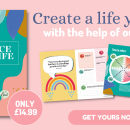Find yourself again after a personal crisis
Navigate the storm of mental ill health and journey towards wellness with greater self-awareness and the belief in a brighter future, writes Caroline Butterwick

Am I still me? How can I get over what happened? For a while, I found myself constantly pondering questions such as these, struggling to sleep as my worries plagued me. Five years ago, I experienced serious mental health issues, and rediscovering and accepting myself has been a challenge. From the pain of realising how my illness had disrupted my life to my need for daily medication, it’s taken me time to acknowledge its impact. I feel irrevocably changed by what I’ve been through, and I’m still making sense of the dissonant parts of myself as someone who’s mostly recovered – but still feels the shadows of illness lurking.
Whether, like me, you’ve experienced a period of mental ill health or been through another difficult life change, such as divorce or redundancy, finding yourself again can be a long road. But many of us can reach a stage of acceptance, and even begin to embrace and find new joy and meaning in our lives in the aftermath of adversity.
The emotional impact
A challenging life event can bring a range of emotions in its wake. ‘It’s helpful to think about four parts of ourselves,’ explains Marianne Trent, a psychologist. ‘We’ve got an angry part, we’ve got an anxious part, we’ve got a sad part, and then we’ve got a more compassionate and balanced part. All these parts are going to have something to say,’ she says.
Trent gives the example of how these four parts speak to us after an event such as losing a job: ‘The angry part may say, “How dare they make me redundant?”, while on the anxious side may be fears around how you’ll pay the bills or find a new role. There can be sad thoughts, such as “I thought they liked me at work”. But the compassionate part recognises that, actually, “Perhaps the company wasn’t doing very well and it isn’t my fault there has been a restructure.”’
Acknowledging these parts of ourselves and our responses is an important part of accepting what has happened in our life and moving forward. Trent uses the word ‘assimilate’ to describe how we can do this. ‘I think in any kind of personal difficulty, you need to give yourself the compassionate permission to lean in to it,’ she advises.
Increasingly, I’ve given myself licence to feel these four parts of myself and the emotions they carry, and to nurture compassionate thoughts about what I’ve experienced.
There’s grief too, which is a common response to going through a difficult life change. Counselling gave me the space to speak it and recognise the sadness and frustration I felt about what I sometimes thought of as ‘the lost years’. My husband is another source of support. He reminds me that ‘the lost years’ weren’t all lost and that there were good things laced through them. That’s not to diminish my depression, but to give me context – the fuller picture that hard times can often hide from us.
Karin Peeters, a life coach and psychotherapist, tells me about the Buddhist parable of ‘the second arrow’, which is helpful in understanding our reactions to challenging life events. The story goes that life throws something really difficult at us – a job loss or the end of a relationship – and causes us pain, which is the first arrow. But then we shoot ourselves with a second arrow, which brings additional emotions.
‘So, for example,’ says Peeters, ‘if we have suffered in a difficult breakup, we might start thinking, “Oh, it’s all my fault,” or “I will always be alone”. And then on top of being sad about the breakup, we feel completely and utterly shattered in our confidence, and may be full of despair.’ If something agonising happens to us, Peeters explains, we can come to the conclusion in our minds that it means something about ourselves. This is us shooting ourselves with the second arrow.

Edge forward
So how do we go about easing out the second arrow? Self-compassion is an important part of it. This can involve letting go of self-blame for what’s happened, and accepting our emotional responses as an important part of processing the situation.
Trent talks to me about the idea of ‘scaffolding’ in our lives. A difficult event can shake our foundations, and make us feel as if we have lost our roots and supportive scaffolding.
To start to rebuild our scaffolding, Trent recommends we think about our values and what makes us happy. For me, writing is hugely important. I’ve also realised that I care about making things better for those who have been through similar challenges.
Challenging life events can shake our sense of identity. ‘There is the loss of an old identity,’ explains Peeters. She says that we can find ourselves in a space between, where the old no longer applies, but there is nothing yet to replace it. ‘And then at some point, there is the new identity. We can never fully go back to that old version of ourselves because we will always be changed, so we can use the opportunity to evolve into a better version of ourselves.’
Finding our new identity and sense of self links back to the idea of connecting with our values. To do this, set aside time to make a list of what matters to you, as well as writing down your goals and dreams in your journal. Perhaps it’s spending more time with those you love or getting a job that gives you purpose.
Once you’ve identified what matters to you, it’s time to think about or research how to make these important things happen. Trent cites how some people who lose a job ask what truly matters to them, then start their own successful business. This is a way of taking control of the situation and seeing what we’ve been through as part of our lives.
Finding yourself again can also mean reflecting on what brings you joy. For me, that was reintroducing socialising, creativity and learning. These were activities that I struggled with when I was unwell, and finding myself again meant reinstating them, often with a newfound appreciation. How wonderful it can be to have dinner with friends, go hiking with my husband or stay snuggled up in bed with a good book! When we go through a challenging experience, we often lose much of what matters to us in our day-to-day lives. Ask yourself if there’s anything you can start to bring back into your present – or if there’s something new you’d like to try.
Reclaim your power
My experience of mental illness weaves itself into so many areas of my life in a positive way these days. I took a major step towards rediscovering and accepting myself when I started working as an ‘expert by experience’ for a mental health social work charity. In this role, I speak to student social workers about what it’s like to live with a mental health condition, and how they can best support their clients who are struggling.

At first, I found it tough to share in this way. But I soon discovered that it helped me make sense of what I’ve been through, and gave me a feeling of ownership over what at times had been a disempowering period in my life. Suddenly, the traumatic challenges I’d experienced took on a fresh meaning and a new significance.
This can be part of what’s called post-traumatic growth, Trent explains. There’s this sense that I’m taking something difficult and turning it into a positive part of who I am today. That’s not to undermine the suffering that can come with mental illness – and it’s important to acknowledge that I’m fortunate to be in a position where I can do this work. But through it, I’ve come to feel that what I’ve been through is a part of who I am. It’s helped me assimilate a difficult time into my present self in a way that connects with my values and acknowledges what I’ve endured.
United we stand
For me, connecting with others who have experienced mental ill health and other psychological conditions helps me accept myself. There’s solidarity in sharing our stories and realising that there are like-minded people who understand. Reaching out has brought me treasured friendships and our discussions have inspired practical ideas on how to steer your way though illness.
You may find that it helps to be part of a support group. The internet is a useful space for making connections, from discussion forums to social media. Or maybe an acquaintance who has faced similar pain could help. And, as you reach out, you may find yourself giving others advice, realising what you have learned on your path to recovery.
Whether you reconnect with your values or speak to others, you are worthy of happiness. ‘It’s learning to give yourself permission to know that you can be happy again in the future,’ says Trent. ‘You can give yourself permission to live a full life, however that looks for you. And that’s not disloyal – it doesn’t mean that what you lost didn’t matter to you. It’s just that, actually, you don’t deserve to suffer for ever. You deserve to have a rich, full and enjoyable life.’
Without a doubt, my illness has changed me. At the time, I believed that things would never get better and I was stuck in a tempest that would never pass. But I’ve gradually come back to myself. My experience of mental ill health is a part of me – one that has shaped so much – and, nowadays, I can take strength from that. Finding myself again has meant recognising the grief and seeing the impact that my illness has had on my life. I’ll never forget how I’ve struggled, but I can celebrate how I’ve rebuilt a life that I’m proud of, and that brings me great purpose and happiness.
Photographs: Getty Images









